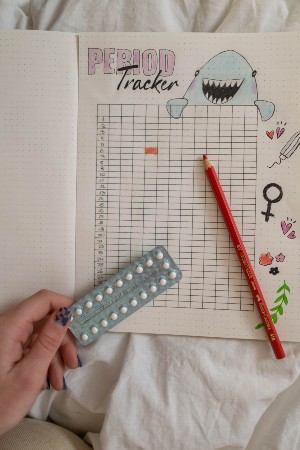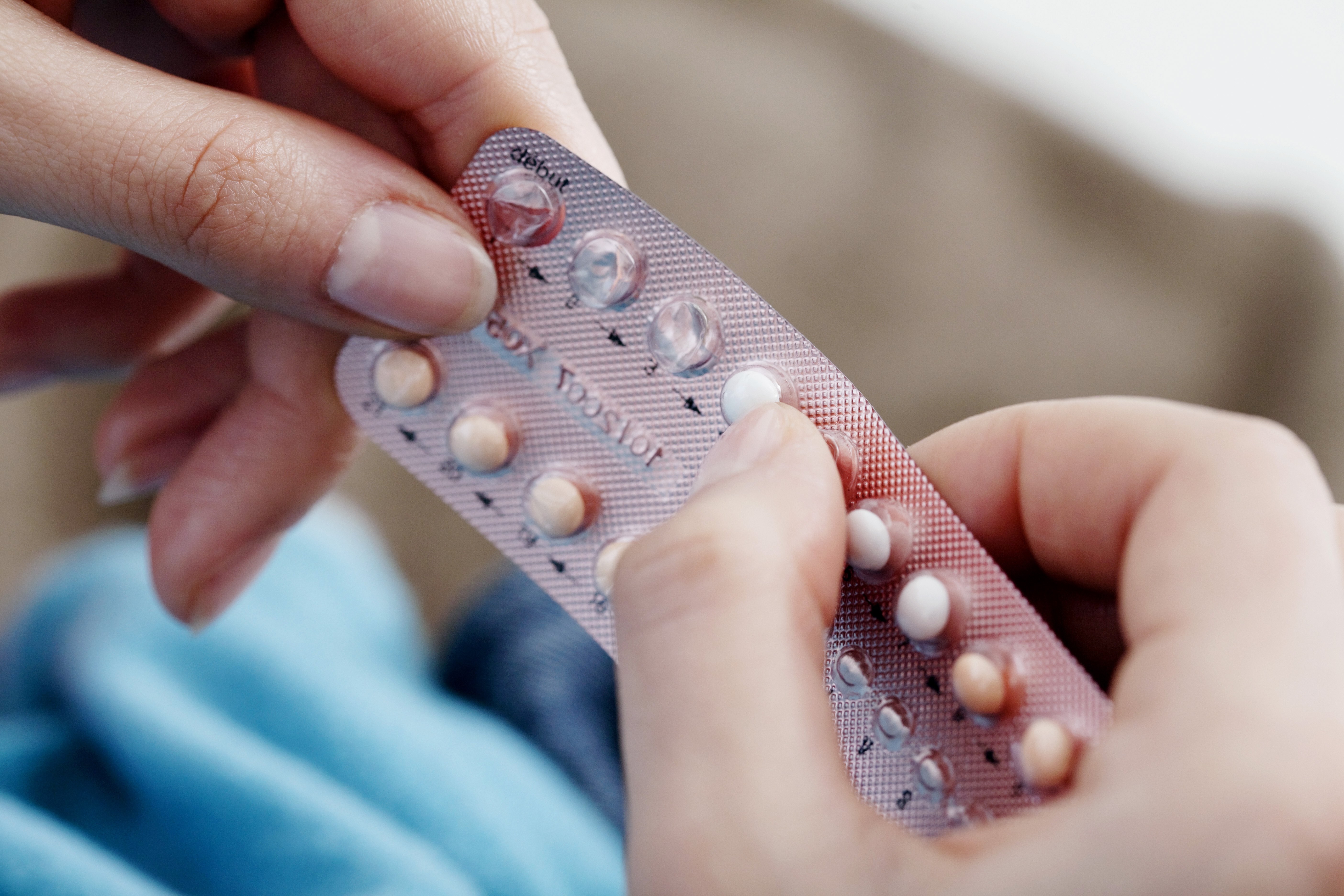
Tips & Tools
Managing your anxiety
Part Two: Naturopathic Approaches to PMS and Mental Health

Dr. Erin TeWinkel is a naturopathic doctor specializing in hormonal and mental health. This article is part two of Dr. Erin's Naturopathic Approaches to PMS & Mental Health blog series. In this part, Dr. Erin discusses mental health and its relation to birth control, supporting yourself from home, and how you can support others. We hope you enjoy these very insightful answers as much as we did!
What if I am on birth control? Will this affect my mood? How can I best support myself?
 Some people who use hormonal birth control will experience more depression. In 2016 JAMA released a study that showed women using hormonal birth control are significantly more likely to be diagnosed with depression. The risk was greatest for teens using progestin-only methods. So being aware and prepared for that potential outcome is important and can be supported with the same options as above. The myth to bust here is that people on OCP (oral contraceptive pill) don’t experience PMS - since the OCP stops ovulation and the cycling of hormones - it's not possible to have actual PMS while on the pill. However, each person’s experience is important - so track what's going on to understand and discuss with your period literate healthcare practitioner.
Some people who use hormonal birth control will experience more depression. In 2016 JAMA released a study that showed women using hormonal birth control are significantly more likely to be diagnosed with depression. The risk was greatest for teens using progestin-only methods. So being aware and prepared for that potential outcome is important and can be supported with the same options as above. The myth to bust here is that people on OCP (oral contraceptive pill) don’t experience PMS - since the OCP stops ovulation and the cycling of hormones - it's not possible to have actual PMS while on the pill. However, each person’s experience is important - so track what's going on to understand and discuss with your period literate healthcare practitioner.
What things can I do from home to help support my hormone health?
To support a healthy cycle means supporting a healthy body overall - our period is a vital sign, just like blood pressure and heart rate! The best ways to support a healthy cycle:
1) Eat enough! And eat mostly whole foods - what does this mean? Fruits, veggies, whole grains, and enough protein - menstruators bodies are very sensitive to low-calorie diets and make all symptoms worse. Data shows that menstruators who eat whole foods with fruits and vegetables and adequate protein have less period problems.
2) Sleep - getting enough sleep helps our body regulate all of its cyclical nature. Being in the rhythm of our sleep-wake cycles sets the stage for our other cycles!
3) Movement - our bodies are designed for movement. The more sedentary we are, the worse symptoms we may experience - but also movement that you enjoy! Walking with a friend or dancing in your kitchen, weightlifting, boxing, cycling…find a movement practice that you enjoy, which will immensely help your mood and your period health.
Also, the OCP does cause some micronutrient deficiencies such as B vitamins, selenium and magnesium, so discussing proper supplementation with your HCP (health care practitioner) can help mitigate this. Deficiencies in B vitamins is linked to worsened anxiety and depression.
How can others support someone going through their time of the month?
One thing I love to discuss with people is the ‘blaming’ of emotions on someone’s cycle. Yes, during your luteal phase, you may feel more and  share your feelings more - but those feelings are still valid. During our luteal phase, we are more in touch with our emotions and share them more readily - too often, menstruators' emotions get pushed away as ‘just being on their period.’ So the number one best way is to listen still and validate a person’s emotional experience. Secondly, menstruating is metabolically taxing - so being mindful that you may need more rest and reduce high-intensity exercises is important to know and support. Plus, helping build the above habits of eating whole foods, movement and sleep!
share your feelings more - but those feelings are still valid. During our luteal phase, we are more in touch with our emotions and share them more readily - too often, menstruators' emotions get pushed away as ‘just being on their period.’ So the number one best way is to listen still and validate a person’s emotional experience. Secondly, menstruating is metabolically taxing - so being mindful that you may need more rest and reduce high-intensity exercises is important to know and support. Plus, helping build the above habits of eating whole foods, movement and sleep!
We would love to thank Dr. Erin Tewinkel for her very insightful and informative answers. We are also happy to inform you that Dr. Erin is now officially on our list of Experts. Check out more about Dr. Erin here! Happy National Women's Health Week! We hope you enjoyed this blog and it helps you support yourself physically and mentally! If you need further guidance with your hormone and mental health, Dr. Erin would be more than happy to help. If you have not read part one of this blog series, you will want to click here to check it out!
 |
Dr. Erin TeWinkel, ND Instagram: @drtewinkel Website: www.drtewinkelnd.com |
References:
Abdi, F., Ozgoli, G., & Rahnemaie, F. S. (2019). A systematic review of the role of vitamin D and calcium in premenstrual syndrome. Obstetrics & Gynecology Science, 62(2), 73–86. https://doi.org/10.5468/ogs.2019.62.2.73
Arab, A., Rafie, N., Askari, G., & Taghiabadi, M. (2020). Beneficial Role of Calcium in Premenstrual Syndrome: A Systematic Review of Current Literature. International Journal of Preventive Medicine, 11, 156. https://doi.org/10.4103/ijpvm.IJPVM_243_19
Bahrami, A., Avan, A., Sadeghnia, H. R., Esmaeili, H., Tayefi, M., Ghasemi, F., Nejati Salehkhani, F., Arabpour-Dahoue, M., Rastgar-Moghadam, A., Ferns, G. A., Bahrami-Taghanaki, H., & GhayourMobarhan, M. (2018). H vitamin D supplementation can improve menstrual problems, dysmenorrhea, and premenstrual syndrome in adolescents. Gynecological Endocrinology: The Official Journal of the International Society of Gynecological Endocrinology, 34(8), 659–663. https://doi.org/10.1080/09513590.2017.1423466
Behboudi-Gandevani, S., Hariri, F.-Z., & Moghaddam-Banaem, L. (2017). The effect of omega 3 fatty acid supplementation on premenstrual syndrome and health-related quality of life: randomized clinical trial. Journal of Psychosomatic Obstetrics and Gynaecology, 1–7. https://doi.org/10.1080/0167482X.2017.1348496
Erman Esnafoglu 1, Deniz Deniz Ozturan. The relationship of severity of depression with homocysteine, folate, vitamin B12, and vitamin D levels in children and adolescents. Child Adolesc Ment Health 2020 Nov;25(4):249-255. Epub 2020 Apr 18.
Joseph Firth 1, Wolfgang Marx, Sarah Dash, Rebekah Carney, Scott B Teasdale, Marco Solmi, Brendon Stubbs, Felipe B Schuch, André F Carvalho, Felice Jacka, Jerome SarrisPsychosom. The Effects of Dietary Improvement on Symptoms of Depression and Anxiety: A Meta-Analysis of Randomized Controlled Trials. Med2019 Apr;81(3):265-280.
L T Møllehave 1, T Skaaby 1, K S Simonsen 1, B H Thuesen 1, E L Mortensen 2 3, C H Sandholt 4, O Pedersen 4, N Grarup 4, T Hansen 4, A Linneberg 1 3 5. Association studies of genetic scores of serum vitamin B12 and folate levels with symptoms of depression and anxiety in two danish population studies. Eur J Clin Nutr2017 Sep;71(9):1054-1060.doi: 10.1038/ejcn.2017.97. Epub 2017 Jun 28.
Siddiqui MJ, Saleh MSM, Basharuddin SNBB, Zamri SHB, Mohd Najib MHB, Che Ibrahim MZB, et al. Saffron (Crocus sativus L.): As an Antidepressant. J Pharm Bioallied Sci. 2018;10(4):173–80.
Skovlund CW, Morch LS, Kessing LV, Lidegaard O. Association of Hormonal Contraception with Depression. JAMA Psychiatry. 2016 Nov 1;73(11):1154-1162 PubMed PMID: 27680324
Szegedi A, Kohnen R, Dienel A, Kieser M. Acute treatment of moderate to severe depression with Hypericum extract WS 5570 (st john's wort): Randomised controlled double blind non-inferiority trial versus Paroxetine. BMJ. 2005;330(7490):503
- All
-
29 Nutrition
Nutrition
- 73 Mindfulness and Relaxation
- 27 Student Life
- 8 Exercise
- 51 Treatments & Therapies
- Anxiety Resources

Don't see what you're looking for? Send us an email!
©Copyright 2024 Cam’s Kids powered by Kids Help Phone
Not-for-Profit Organization. B/N: 921508-5
Thanks for visiting Cam's Kids. Please remember...
Cam's Kids is not a service provider.
If you are in crisis, please call 911 or go to your nearest emergency department. For free, confidential counselling, contact Good2Talk or Kids Help Phone.
Post-secondary students: find your local crisis resource here.

